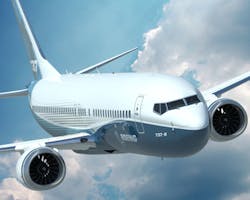Boeing commits to deliver commercial airplanes ready to fly on 100% sustainable fuels
SEATTLE - Boeing is setting a target to advance the long-term sustainability of commercial aviation, committing that its commercial airplanes are capable and certified to fly on 100% sustainable aviation fuels by 2030. Boeing has previously conducted successful test flights replacing petroleum jet fuel with 100% sustainable fuels to address the urgent challenge of climate change.
According to the Air Transport Action Group, U.S. Department of Energy and several other scientific studies, sustainable aviation fuels reduce CO2 emissions by up to 80% over the fuel's life cycle with the potential to reach 100% in the future. Today, sustainable aviation fuels are mixed directly with conventional jet fuel up to a 50/50 blend — the maximum allowed under current fuel specifications. In order to meet aviation's commitment for reducing carbon emissions by 50% from 2005 levels by 2050, airplanes need the capability to fly on 100% sustainable aviation fuels well before 2050.
Boeing's commitment is to determine what changes are required for its current and future commercial airplanes to fly on 100% sustainable fuels, and to work with regulatory authorities and across the industry to raise the blending limit for expanded use.
Sustainable aviation fuels can be made from a wide variety of feedstocks, including non-edible plants, agricultural and forestry waste, non-recyclable household waste, industrial plant off-gassing and other sources. Sustainability of the fuels is assured through strong, credible sustainability certifications through third-party organizations such as the Roundtable on Sustainable Biomaterials.
